Text
Theatre doesn't owe us authenticity
Or rather, theatre doesn't owe us perceived authenticity.
I think about this all the time, coming from a theatre studies background. So many plays, fringe shows, musicals and so on (extending to film and TV) are based on real-life stories. They're based on interesting historical events, figures, musicians, politicians, and moments in time. And the closer we get to present day, the harder it is to divide our experience of them and media surrounding it.
The Crown's audiences generally agree that the earlier seasons were more successful as audiences learnt lesser known parts of the Royal Family. And the latest season was just too close to what we've already experienced that it didn't feel true to what we already knew.
But we're not owed authenticity.
My motto with all theatre, and indeed film & TV, is "it's not a documentary". They're adaptations; they're telling us something through a specific lens, focused on particular moments or ways to analyse the present with events of the past. My domain with theatre, outside of musicals, is documentary and political theatre. It's always sparked my interest, specifically verbatim theatre as I wrote a semi-verbatim piece which I had a staging of years ago.
But even verbatim theatre doesn't owe authenticity to the material, to the subject matter and beyond. Let alone fictionalised retellings of events, which have the tall order of creating dialogue for undocumented conversations.
Before I move on, when I say "authenticity" I mean deep, analysed accuracy of a historical event or person, identified from all angles including right and wrong, present and past, real-time movement and public perception.
Take Hamilton - which I think is the ultimate example of this, and perhaps the extreme. Notably it has colour conscious casting to grapple with America's foundations through a modern lens, but it has the impossible task of refining years' worth of history into three hours. We have, generally, accepted this to be okay and a good example of not only musical theatre, but storytelling as a whole. And paved the way for the likes of Six the musical and Sylvia to adopt similar approaches.
And yet, we're still met with other musicals and plays that demand authenticity from some audiences. Despite us knowing that, through shows like Hamilton (obviously not the first) an exact retelling of events and the people in them is not even necessarily the best way to present theatricalisations of history.
It just sends my mind into a frenzy.
The three musicals mentioned above, perhaps, because now no one knows any parties involved due to passage of time are given an allowance to have inaccuracies and poetic licensing. Or the topics just aren't as commonly known and are therefore less open to history pedants (you'd be surprised at how many people don't know Henry VIII even had six wives).
Theatre at its roots can't give authenticity and nor should it. I think partly why this is a demand from audiences is because, again, shows like Hamilton feeeeel like a proper retelling of the founding of America because there's so much information in there, even if it's definitely not. And other West End, or big glitzy shows, *should* have done their due diligence into making it the most accurate, modern day-led angle in analysing the events. And maybe small shows with small casts in a small studio would be allowed to play with it all a bit more. But this dispensation should be allowed for all theatre.
I'm whittling on, but let me give some examples:
The recent Just For One Day at The Old Vic. It's impossible to hold this show to a standard that accurately represents Live Aid and its performers - so it actually took a step back to not do that which was a nice surprise. It kind of has the songs featured in the concert to score the creation of Live Aid, its fans and its key figures. In some ways, perhaps that is it giving authenticity and leave the actual concert to rest. But there's the angle that it's not diving enough into the criticisms of Live Aid from a modern perspective, or even from a 1980s perspective. It doesn't do enough to show that Live Aid perpetuates a white saviour complex.
It just doesn't have to. Maybe you walk away thinking "actually this has given me a really sour taste of what Live Aid was", and that's a great thing to take away. Querying and questioning the material and topic are totally acceptable things.
But deciding whether or not Live Aid was right wasn't the purpose of the piece. These topics are drizzled in, but ultimately Just For One Day is somewhere between a nostalgia trip for those that remember the concert, and showcasing the power of music and the world pulling together for a humanitarian effort.
A more tricky note for me was Dear England. It drew in a crowd of people who don't typically go to the theatre, and I think some were (similarly) taking away different points from the show. I had people say to me that they didn't like it, or that they were uninterested in seeing it, because it was trying to convince them that Gareth Southgate is an excellent England football manager. I mean, it doesn't, but some may confuse topic with sympathy. It's just a fictionalised retelling of those key years. It's *not a documentary*. It's not telling us to think anything of the people involved.
Also, Operation Mincemeat. There are so many other interesting angles to analyse Operation Mincemeat by, so many other theatrical devices to do this by. But landing on farce just so perfect for the piece, a clever way to marry the material to theatre and ultimately make it entertaining. The themes go beyond just placing a historical event on stage - and in the process must take dramatic licensing.
Dramatic licensing, whether that's truncating the story to actually make it a bearable 2.5 hours and not a real-time 10 year event, or altering figures to become comic relief, for example, is a necessary theatrical endeavour.
On a different note, take book to stage adaptations or film to stage adaptations. They're some of the easiest places to get critics as generally their audiences are people who love the source material.
The Time Traveller's Wife has been a film and a TV show, and now a musical. It's a book so beloved that I kind of love hearing why the film is bad or good, or the TV show is bad or good, as an adaptation. And much like the musical, it's simply that - an adaptation. Dialogue will change, scenes might move about, characters might not get as much stage time as they did in the book (page time?).
Back to the Future has made some necessary changes - the Libyans don't feature in the stage show despite being the major driving force for the actual plot of the film. And, perhaps due to sensitivities, that changed for the stage show. And it works (in my opinion - although I want to make it clear none of what I'm discussing in this essay are actually whether I think it 'works', rather it's theatre so it doesn't have to). Removing something that is either offensive/outdated or tricky to stage, and replacing it with something that drives the plot forward of equal quality.
Audiences need to free themselves from the notion that theatre must be perfect at all times, and that X Show: The Musical! should be THE DEFINING adaptation, and THE DEFINITIVE new take on something.
Theatre is always an exploration, and some may be more expensive or deeper analysations than others. But it's not a prerequisite for making it.
0 notes
Text
London's £150 theatre ticket problem
Recently, Andrew Scott spoke up about the £150 theatre tickets that are on sale across West End shows. I mean, apart from glaring inaccuracies in the article ("Tickets for Plaza Suite, which stars husband and wife Matthew Broderick and Sarah Jessica Parker, cost from £125 to £395." is just untrue - unless when I paid £35 for my ticket, I somehow spent £125...), statements like this are simply misleading. And in my opinion, actually do more harm to the public's perception of theatre than good.
This is not defending £150 theatre tickets - the pricing of which is a whole other discussion. It's that £150 is practically never the average price of a ticket, practically never the price that most tickets are for one performance of 600+ seats and according to The Stage's report, just slightly above the average MOST expensive ticket.
The average cheapest theatre cost in the West End is around the £25 mark, according to SOLT. I'm not one to decide whether £25 is affordable, accessible or whatever. But £25 for a West End show, one that is deemed by the public at large to be the best quality in the world on par with Broadway, seems reasonable to me.
Celebrities and other major names saying that tickets are £150 is harmful for many reasons. One being that reading hot statements like that, from the average non-theatregoing joe public member's point of view, may reinforce the idea that theatre is not for them. That theatre is too expensive.
But a gentle reminder that the West End is not the only theatre you can attend is rarely mentioned. Across the UK, there are 100s of theatres putting on full programmes of productions throughout the year. And most of their ticket prices don't even graze three figures.
It's the public's perception that the West End is high-quality (not always), the West End is the best theatre that can be produced (not always) and that anything that isn't in London, and specifically the 39 West End theatres, must be made by amateurs and wannabe theatremakers.
Under 30s, for example, at Chichester Festival Theatre can enjoy £5 tickets across all their productions throughout the year. Theatre Royal Bath's tickets range from £9 to £60. Bristol Old Vic's tickets rarely exceed £60. Here, I've listed you three producing (and receiving) houses who have shows that regularly, with high regard, transfer to the West End. That place where, once it hits those theatres, it is suddenly of high quality. It's suddenly recognised.
And even then, it's worth reminding ourselves, despite The Guardian's article, that £150 for a show in London is not normal. And that's not even mentioning places in London like the Royal Court who have cheap tickets, and develop high quality shows. Or the Lyric Hammersmith. Or the Bush Theatre. Or Southwark Playhouse. There's so many options to experience theatre at a fraction of the price, and receive high quality entertainment.
Even for shows with big celebs £150 is not the only option. There are times when it's often the only price band left, sure. But that's the unfortunate repercussions of shows with big celebs - they attract crowds who purchase the cheaper tickets faster.
Maybe we should start questioning actors and producers who select to do high profile shows in London, where rates and stakes are higher rather than grassroots theatres across the country. We know that X famous actor in Y show in Z London theatre will have extortionate tickets. That's less likely to happen in a producing house across the country.
Why don't we start questioning the intention of the production? Ultimately theatre is a business, and that's why. The rest of London relies on theatregoers - much like the towns & cities other theatres are located in - but remove Matt Smith, David Tennant, Tom Holland and everyone else in major West End shows and there's a knock-on effect elsewhere. But no one does ever seem to ask "why does this have to be produced in London?".
Anyway, there are cheaper tickets available in the West End. And that's just an unfortunate fact some clickbait-led folks will just have to accept.
Sure, saying "actually there are cheaper tickets available" (even in the West End) doesn't make the news, doesn't get clicks and certainly doesn't drum up engagement.
I also really can't be bothered to get into "it's only the shit seats that are cheap" because you and I both know you're only kidding yourselves at this point. It's been proven untrue so many times. I also don't want to nod to rush ticket and on the day lotteries because as someone based regionally, I know this just isn't an acceptable way to purchase tickets for most of the country.
But I think it's probably worth noting, for the future of theatregoers, the future of our 16-25 year olds that Andrew Scott mentions, and the future of theatre at large, that £150 is by no means the average ticket price, the expected ticket price or the only option.
0 notes
Text
Do we need a Spongebob Musical?
It's the question that's been going round some circles of Theatre Twitter these last few days. And the objective answer is no; no we do not need a Spongebob Musical. But do we need any musical?
The question seemed to kick off when people were taking the mick out of Ethan Slater's performance in Spongebob following the drama that's occurred behind the scenes of the Wicked movie. It spiralled from generally being unimpressed with the man's behaviour, to questioning why Spongebob needed to be a live action stage show.
One user wrote: "regardless how fun it might be or the music, just should not be a musical imo. & I feel like it looks bad on the industry too cuz it's all about $$$ not good stories"
This is something that has always itched my brain. I briefly discussed it before regarding The Great British Bake Off Musical. Do people not realise it's showbusiness? Sure, the art is important too, but Commercial Musical Theatre, at large, is not concerned with art - once it's reached that point, it's about operation. If it's hit a Broadway or West End stage, it's pretty much too late to worry about whether it's "needed".
But there's just so many layers to unpack
Why does Spongebob (and indeed Bake Off) take the hit over, for example, Wicked, also based off pre-existing IP?
Why does Wicked (again for example) get a free pass in being about art and not about money making, when in its entire tenure on both sides of the pond has made very few tangible alterations to the show, this being about money not art?
And finally, the question I'm next going to explore: Why do we need to ask "do we need this to be a musical?"?
It's far less often we ask "why does this need to be a TV show?" or "why does this need to be a movie?". What is bothering people so much about what graces the stage? There is space for varying types of media, with varying topics and varying styles. It's not like it was Spongebob or some up-and-coming indie exploration into the rollercoaster life of a Hungarian pilot seeking major change within a corrupt and callous government. In the UK, it's summer and the production company wanted to put on a family show.
Plus, who decides what's an acceptable thing to make a musical about? Producers with power and money? The people at large? Folks on Twitter? It's treading tricky ground if it's the producers alone, but it's too late by the time it hits the stage. What do people want? A running poll of what is the next musical subject matter that's acceptable to hit any stage? If people are worried about certain shows taking up precious space in the West End or beyond, then rest assured it'll probably close. Not because it's not good, but literally every show that has ever existed, good and bad, except the ones running right this moment have closed. It's a natural part of the ecosystem.
We (the people) accept all the shows that came before us as part of the musical theatre canon - do we NEEEEED a musical about an 1800s opera house pervert? Do we NEEEEEEED a musical about trains on rollerskates? Do we NEEEEEED a musical about a singing Austrian family escaping the Nazis?
We need none of them. But without art and music, what are we? The people who question whether a musical is needed don't realise that this all feeds into the current political sphere that art isn't necessary, art isn't a viable career, and much less deserves the funding it is so often stripped of. This leads to already famous and successful non-theatre writers having a go at composing scores for musicals where it should be handed to people who love the medium for what it is, and what it's crafted to be like.
Because it largely existed in a time before most of Theatre Twitter generated critical faculties regarding these arguments, Legally Blonde is a musical that we accept as part of the musical theatre canon. We don't question whether it's needed because, on the whole, the community accepts it as 'a good musical'. If it were created today, I'm sure there'd be questions on its legitimacy as a musical. If we're talking whether the quality of musicals has dipped, that's (in my opinion) little to do with basing shows on pre-existing IP, and more a question of quality of storytelling alone (and funding of new writing, new spaces and freedom to creatively explore).
Some argue that shows based off pre-existing IP are 'less creative' as a whole. Be that film-to-stage adaptations or a jukebox musical using songs already in existence. I argue that nothing is original. Shows based off books, for some reason, get a free pass in being a musical. Shows based off historical events also enjoy that same freedom.
Again, in my Bake Off blog, I mentioned about Pretty Woman. This was specifically in reference to the fact Bake Off, in comparison, is from rising star musical theatre writers who are British - this is such a rarity on a West End stage and to dismiss it for being based off the TV show is doing a whole medium a disservice. The creativity isn't limited to subject matter or a general basis of IP to work with - the characters, the costuming, the humour, script, design... all of it plays a part in creativity. Pretty Woman is written by a rock star who doesn't write for musical theatre - but we didn't question that show's legitimacy for stage anywhere near the levels of Bake Off.
Further to this, Memphis the musical. An original story, yes. Original music, yes. Again, by a rock star. With the additional fact it's about segregated America written by a white guy, and predominantly about a white guy. 'Original' stories shouldn't get free passes to unquestioned stage time just because they're original.
I agree, from a neurodivergent perspective, that shows that follow real-life stories that are docu-verbatim style infinitely interest me more. For example, The Sound of Music as alluded to earlier. But it takes so many liberties with the true story for artistic purposes (obviously) that it is, at the end of the day, art. Of course it helps the show is a masterpiece. But the fact it's a true story alone doesn't mean it's told well with staging, music, direction, costume... or anything that makes a musical the medium we know and love.
Hamilton being another example; it covers years worth of political and personal tribulation that of course it's going to take some poetic licensing to serve the story. But the fact that it's true (to some extent) shouldn't be the be all and end all of its acceptability to be on stage.
And to continue a point from earlier, musicals are about money. If Hamilton, in 10 or 15 years time, is using the same design, orchestrations and costumes, should it be lucky to still be open, then how is that less of a cash-grab than [Insert Film Here] the musical? It just recoups the money invested and stays as is, and we're fine with it generating money in that form forever more. But Spongebob the musical is bad because producers want money? It's like some people just don't want musicals to exist.
And there are people that don't want any to exist. And herein lies my issue with the whole argument; Theatre Twitter have a few back and forths about Spongebob the Musical being legitimate, but not realising there are people in the wider theatresphere that don't think any musical is acceptable (and often lump shows like Les Mis, South Pacific, Bad Cinderella and Jersey Boys as one bungled together genre). And then there are people who don't like any form of theatre. And film fans who look down on TV. Which rolls back to my point about where funding for the arts goes or if it's cut. Ultimately no one wins when we argue about legitimacy of shows.
So can we just have silly musicals?
0 notes
Text
The West End's Premium Priced Ticket Problem
This isn't a thinkpiece on whether or not premium priced theatre tickets are acceptable or not - rather a comment on the general discussion that Twitter users had over the last few days regarding the current cost of theatre tickets.
The West End relies on the tourist market - i.e. those with money who want to see the big long-runners or Hollywood stars. But if we're wanting to continue to create a diverse, theatre-loving UK, we need to stand up to ensure that domestic theatre tourism have a fair way of accessing tickets.
Sparking this debate on Twitter was Theatre & Tonic who posted a screenshot of the seating plan for The King and I's return to the West End, and commented that the prices aren't accessible. From the plan, the majority of the stalls seats are £75, with the lowest price being £35.50 (where the view is majorly obscured by the circle's overhang). Some of the tickets were over £200 - which prompted a lot of conversation on Theatre & Tonic's thread.
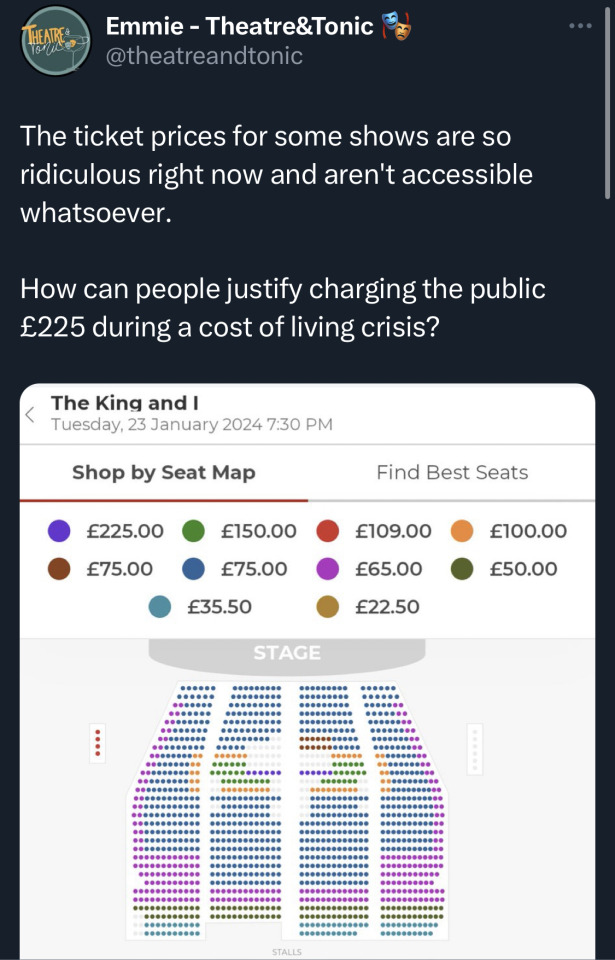
I was surprised to see a fair few people defending the pricing - with examples that, to me, seemed deeply unrelated to the original comment. For me, the advance price tickets are what is putting audiences off - which is money in the bank that sustains theatre.
Of course, top price seats are not reflective of the entire pricing range, nor are they reflective across all shows in the West End. It's worth noting that The Stage found top price seats in the West End are 20% more expensive than pre-pandemic, and the lowest price seats are about 3% more expensive. But seeing those triple figures for some shows must be disheartening for those who aren't as savvy in finding the cheaper seats. Even then, cheaper seats are often in the form of 'side restricted view' or 'limited legroom' - not exactly a thrilling subtitle for an expensive outing.
I also don't think it's helpful to draw comparisons to Broadway, like some users on the thread did. Broadway boasts higher wages, larger rents and bigger costs.
The King and I's UK tour has sold pretty well so far, where I imagine star-casting Helen George has drawn in a lot of the audiences. I bagged a ticket in the presale, before casting announcements, for £25 at my local venue. When I had to return that ticket due to illness, that ticket was resold for £51 - over double!
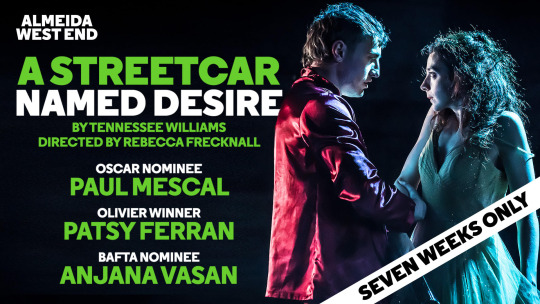
The last few weeks have also shown some users bring up the fact A Streetcar Named Desire, starring Paul Mescal, has tickets exceeding £300. And while that's true enough, I don't believe Streetcar should be made an example of for the argument being made here. There was sufficient time to sign up to pre-sales and grab the cheaper tickets, of which 83% were under £100 and 7000 were £25. The £300 seats are in the 'final release' of tickets - and it's not like a Tennessee Williams show with a Hollywood actor in the West End is under the radar edgy theatre.
Some have drawn comparisons to Theatre & Tonic's example of The King and I's launch pricing to A Streetcar Named Desire's dynamic pricing. But it's worth noting that The King and I can't overly argue supply and demand like Streetcar can - sure the UK tour could be a litmus test for demand, but it's a musical that generally skews older and is reaching audiences in their hometowns rather than the capital.
Perhaps my controversial opinion on this matter is that commercial theatre, such as the West End, is a business and the dynamic pricing at play is not the worst of what's going on; the advance ticket prices of usual West End shows are leaving a lasting impression on aspiring theatre-goers, particularly where decent cheaper seats are not readily available.
Rush Tickets

One of the popular counterarguments to premium priced seating is the fact they help subsidise schemes like TodayTix's Rush Tickets, where you can be in with the chance of getting £25-30 seats on the day of performance. This point of view, to me, is without nuance.
Some pointed out that The King and I is likely to go on TodayTix's Rush scheme. I personally feel like the average person in TK&I's demographic isn't going to whack out their smartphone to try Rush. But also, the reliance of Rush for cheaper prices (and discounts closer to the time when they panic that no-one has bought top price tickets) entirely mug off those who loyally put money into the theatre early on to secure their seat.
As theatre lovers, we often take for granted that we know the 'tips and tricks' of using Rush, but we have to put ourselves in the shoes of the average UK citizen. We can't apply London-centric schemes on everyone who comments that advance theatre ticket prices are expensive to those who can't do Rush out of location, time, choice of show and so on... Schemes like this aren't "accessible", merely a Get Out Of Jail Free Card for producers, and a lucky win for those who get them. Plus, if everyone in the UK who wants to see theatre tried for Rush, then there'd be no chance of receiving the tickets. For example, The Choir of Man releases just 8 Rush Tickets per performance.
You can't always just hop on a train minute (because you can't complain about train prices without someone saying you could have booked an advance ticket a year ago when mercury was in retrograde on a dusky Tuesday morning...) - but because you have to expect a level of disappointment with these options. Cheaper schemes for accessing tickets shouldn't have to be at odds with living outside of London.
If you're going with your kids who want to see Frozen, or going with your mum who's intent on seeing Pretty Woman, neither party are probably going to accept To Kill A Mockingbird as a reasonable alternative. Us regulars might not be so fussed, but the only way to ensure you see a show is to book in advance. And those advance tickets at present can come with a hefty price tag.
But back to The King and I, imagine you're the average UK earner on roughly £25k, you don't go to the theatre often and you want to to take your nan to see the show - those prices stated are probably going to make you think that that's the standardised ticket cost. Well, it's theatre after all so it's a fancy occasion, right? It's for the elite and should be expensive - is what some might think.
The Olivier Awards
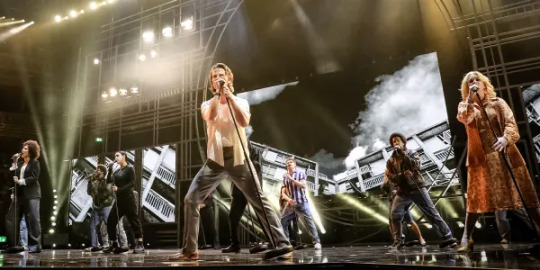
Last weekend, we celebrated the 2023 Olivier Awards ceremony with major wins coming from new northern-penned musical Standing At The Sky's Edge. The highlights from the ceremony were shown on ITV at 10:15pm.
A lot of theatre fans on Twitter cried out for the full ceremony to be shown, stating that there's enough demand for this to happen... (one example below). I personally do not think there is enough demand. Award ceremonies have had dwindling viewers for a long time with the death of live TV - and the fact they're generally pretty long, boring and out of touch.
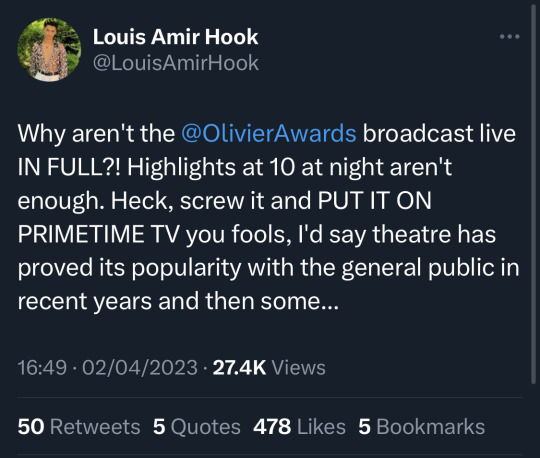
"But Rebecca, what the hell does that have to do with ticket prices?!"
Well, ITV generally skews towards northern audiences and take up a much larger proportion of ITV's audiences than other regions in the country. What's the point of live screening the London-centric Olivier Awards when their audience's best chances of attending any of the theatre showcased is beyond their price point?
Standing At The Sky's Edge, supposedly representing northern working class audiences, is due to head to the Gillian Lynne Theatre in 2024 where Crazy For You's current advance prices also hit the £200 mark - certainly a world away from the National Theatre's £10 Friday Rush scheme.
Even the actors admit the cost of tickets are pricing people out. At the Olivier Awards, Derek Jacobi stated the prices were "disgusting" and that cheap tickets were key to him becoming a passionate theatregoer - understandable as an actor from a working class background.
Again, I'm not here to comment on why premium pricing is in place, or whether it's an acceptable model for West End shows. But the consequence of top price tickets will be a catalyst in ensuring theatre does not succeed in diversity, and will outprice loyal audiences who have want to support the arts.
What are your thoughts?
2 notes
·
View notes
Text
Review: The Great British Bake Off Musical at Noel Coward Theatre, London ★★★★★

Every few years, the West End is blessed with a new, witty British musical that captures the hearts of its audiences. And in 2023, The Great British Bake Off Musical, written by Jake Brunger and Pippa Cleary, does just that. Following its predecessors like Calendar Girls and Made in Dagenham, this show packs all the right ingredients of the TV series while neatly blending a storyline in a musical the length of a Bake Off final.
In true Great British Bake Off style, the musical follows a range of eclectic, charming characters, led by hosts Kim (Zoe Birkett) and Jim (Scott Paige), who applied to be on the TV show for a variety of reasons. Cambridge student Izzy's (Grace Mouat) ulterior motive is to become a baking influencer and Beyonce's best friend — her number 'Obviously' sets a great tone for the sharp lyricism to come in the show.
But of course, once we’ve met the contestants, everyone awaits the grand entrance of the judges - Phil Hollinghurst (John Owen-Jones) and Pam Lee (Haydn Gwynne) who lovingly parody Paul Hollywood and Prue Leith. Their on-stage chemistry, showcased in their duet 'I'd Never Be Me Without You', is one of the highlights of the show.
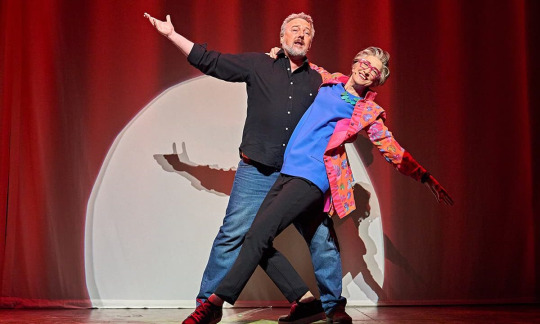
Despite its ensemble, Bake Off largely follows the unfolding love story between Gemma (Charlotte Wakefield), a carer from Blackpool who joins the show as a back-up contestant, and widower Ben (Damian Humbley), whose daughter Lily applies on his behalf. This moment is scored by the particularly beautiful 'My Dad', spotlights the writers ability to unite humour and heartbreak.
It's clear Brunger and Cleary have a great appreciation for musical theatre with each song seemingly pastiching a variety of musicals from classic to vaudeville to modern — notably composers like Kander and Ebb and Lin-Manuel Miranda. And no musical is ever complete without a good lament, and in Bake Off this came in the form of showstopping Bab's Lament, taken on by the fiery Claire Moore to rapturous applause.
While it felt the audience took a little time to warm up to Bake Off - perhaps, through its broader appeal, brought in those who don't usually opt for a musical - by the time each character and their eccentricities was established, the Noel Coward Theatre had a charming and wholesome atmosphere.

Bake Off has the power to stay fresh with topical tidbits (noting the current tomato shortage) and social media trends while managing to not feel like dad dancing. And if there was any doubt the quintessential Britishisms tightly knit to the fabric of this show would not translate, the Americans I had the pleasure of sitting next to were laughing louder than anyone!
The Great British Bake Off Musical is cooking up a storm in the West End until 13 May, with tickets direct from the box office here. It is now available on TodayTix's Rush.
*Tickets for this show were kindly gifted, photography by Manuel Harlan.
31 notes
·
View notes
Text
My theatre wishes for 2023
No doubt the year ahead will be another year of financial recovery for the arts. The majority of shows we're promised in the West End, around London, and across the country, are sure fire crowd-pleasers, jukebox musicals and family friendly productions.
And it's necessary at this time.
So I'm going to share three stagey wishes for theatregoers, bloggers and the wider industry for 2023 so we, as a theatre community, can continue to support the arts.
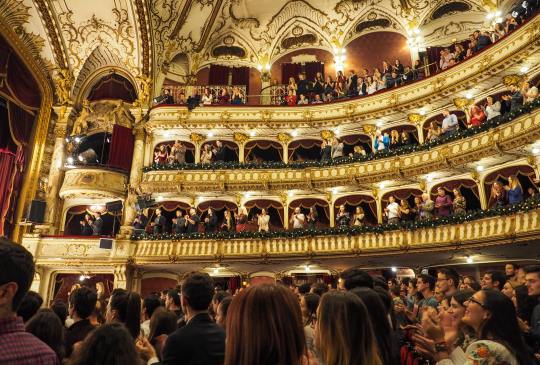
For the theatregoers
Hear me out. Instead of seeing the same show for the 100th time, why not try something new that you'd never ordinarily see?
For example, you may love Heathers. You may pop down to Heathers two or three times a month to catch the various understudies and covers that are stuck in The Other Palace's revolving door. But, for just one of those times, switch it up. Try a new venue that isn't owned by Bill Kenwright and encourage popularity from your probable youth to another show. Perhaps, if you see one show 10 times a month, see it nine times and treat yourself to a new show for the 10th.
I think of it like this: some of the first shows I ever saw, I hold near and dear to my heart. Like We Will Rock You - it was a great show that served a purpose and brought so many people to the world of musicals. But, since seeing other shows, I've learnt to appreciate other types of storytelling, composition, characterisation and production level. It doesn't make me any less of a fan for trying other shows and developing a taste for something else, and I'm not in competition trying to see the most amount of people in the main role.
Ultimately, nothing will ever recreate the magic of one of your first shows, or one of your favourite shows, but I couldn't appreciate how much I liked musicals until I saw other shows.
Variety isn't just who's on for whichever character in one show that day, it's finding shows of different styles, age ranges, spaces and so much more that allows theatre to become diverse. We joke that Heathers will run forever, but ultimately it's owned by someone who has the cash over other venues.
So, if you like Heathers, why not try Oklahoma? It's a completely different musical, yet reimagined for the modern age. If you're a fan of Six, why not try Sylvia at The Old Vic? A modernised retelling of historical figures yet its composition is more than enough to be trying something new. If you like &Juliet, why not try The Bodyguard on tour? A jukebox musical of powerhouse anthems yet ignites a different set of emotions.
But even better – support your local theatres, community projects, amateur dramatics and not for profit theatres across the country by buying tickets for their shows.
Oh, and stop being over-familiar online and at stage door to your favourite actors.

For the theatre bloggers and critics
This year, I wish for theatre bloggers to just do more.
I'm not overly interested in reviews (I personally am not swayed by them at all - unless they're through the lens of theatre studies). Plus, there’s so much territory that bloggers don't cover in reviews because it's taboo, they think they'll upset the PR company, and a variety of other things. But reviews serve a purpose.
And that's fine.
But if you’re not contributing worthwhile reviews, the odd tweet about a free trip you went on is lazy.
Telling me, a paying theatregoer, that I should spend £50 or more on a ticket to a show you got for free, when all you can tell me is that you had a "fun time" in lieu of a review is borderline insulting. Of all the things bloggers and critics review, why should I go to this one instead of the ones they saw last week for free?
Add something.
You're a fan, aren't you? You're just like us, right? Make content surrounding the experience; tell me that you did your research before on how this production fares against the iteration from ten years ago, tell me, or show me, why I should spend £50 on this show over another show I'm angling for.
I've been lucky to score some press tickets in the last year, so I know how much these theatres shell out to get theatre bloggers to come and give social media coverage, so make it bloody worth their while. Make interesting content that people want to come back for.
Importantly though, theatres actively lose money to hopefully make some out of the content YOU make. They want your social media skills and competence, plus your dedicated following that you've grown, to help them, in exchange for you to have a nice jolly at the theatre, with your free programme, free sweets and free bubbly. So at least don’t insult them and your followers with lazy content.
Oh, and declare your freebies because it is a legal requirement to do so.
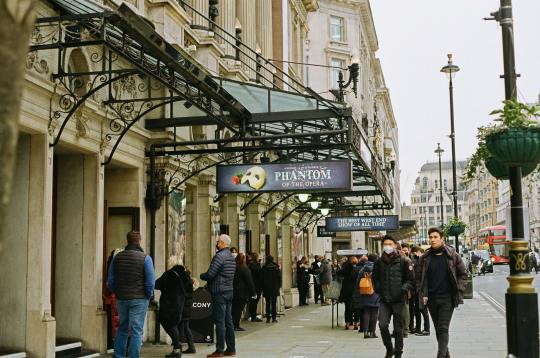
For the theatre industry
I mean, there's no real way to start, is there? There's so much that the last few years alone have exposed.
I was thrilled we’ve kicked off 2023 with Equity’s increased pay agreement and that new working conditions must be met. This includes the responsibility for touring producers, who now must provide accommodation for their staff (something that particularly worried me as it would turn star talent away from the decaying touring market).
But there’s a few other things I’d like to see in 2023 – they’re not necessarily the most significant or the ones that will drive huge change, just things that would be nice.
I'd like to see drama school audition fees abolished as it will astronomically help those who can't afford to drop that much on two minutes of their life.
I'd like to see dedicated effort in supporting new work, specifically new British musicals, that allows the general public beyond London to come (i.e. not a concert staging on a Monday night).
Theatres supporting their fans – perhaps through a loyalty scheme or asking vocal fans to produce social content in exchange for gifted tickets (basically bloggers but with a motivation to showcase the production).
And it’d be nice to see earlier start times for shows so people have more options for public transport. Literally starting at 7pm and finishing at 9:30pm makes a world of difference. If they can prove it, I’d argue it could make a decent “green” PR campaign.
So, with so much new theatre heading to our stages, let’s do what we can to support it!
0 notes
Text
Is Newsies immersive?
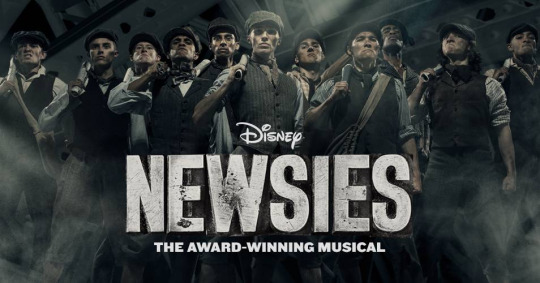
Newsies is on the brink of opening at Wembley's Troubadour Park Theatre. It's the sensational gem of a Disney show which scores the newspaper boy strikes in New York City at the turn of the 20th century, with its most powerful tool being the medium of dance at the heart of the show.
This new production in Wembley is not a replica of the original Broadway production, which can also be streamed on Disney+. It has a new producer, new creative team (although wonderful homages to the original choreography... fans will easily spot them!) and quite obviously, a new style of auditorium to work with.
Newsies was pegged to be a "brand new immersive production in the round"... but is it?
In short: no.
A while back I wrote a blog about immersive being the new buzzword in theatre. And I stand by all the statements I had regarding Newsies as pretty much all of what I predicted has come true.
This isn't a bad thing! Newsies is a great show, and so rarely do dance heavy shows, and actor-dancers, get such recognition in modern musical theatre.
It just isn't immersive, and that's fine. I'll share why.
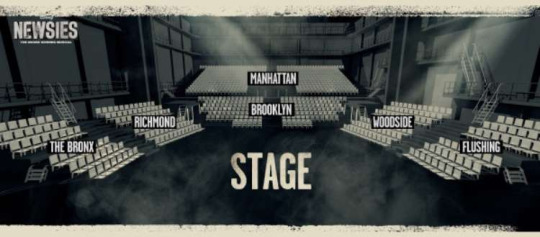
The Troubadour Wembley Park Theatre is effectively a black box studio, so it can be rejigged for any sort of incoming production. In fact, the latest Secret Cinema event was held here - one of the few productions on the market that arguably are fully immersive.
It's also formerly the studio where X Factor was filmed, so it's absolutely massive. And much like the X Factor, the majority of the audience are directly facing the stage in a standard raked seating format.
Let's take a look at the space for Newsies. The above image is what was shared back in March, and as you can see, it's a thrust stage, rather than "in the round" like the press release suggested.
There is, though, a slight difference to your usual auditorium - there are aisles, walkways and entrances in the auditorium where performers enter, exit and perform throughout the show that aren't the wings. For example, between Manhattan and Brooklyn there is a key walkway and entrance. But I'd say it's akin to the Lion King in terms of this being "immersive".
So what got us all tied up about thinking Newsies being immersive?
We've all been saying it's immersive since we read the headlines about the UK premiere of the show.
The website for Newsies says the following:
"In an innovative and brand new production at Troubadour Wembley Park Theatre, theatregoers will be thrust right inside the action as the newsies dance, sing, jump and fly around the streets of a booming 19th century New York City. "
And this is absolutely correct. The Newsies do indeed dance, sing, jump and fly around the auditorium in a way that the original Broadway production's cast did not - and quite beautifully so, might I add. The audience are "thrust" right inside the action (nice pun on the space from them).
But interestingly, the press release first launched in March this year which verbatim follows the above wording actually used to say this:
"In an innovative and brand new immersive production ‘in the round’"
Now, as we've established the space is certainly not in-the-round, it's much closer to being a thrust stage with walkways and aisles. And that's now been reflected on the website. But equally, as they've removed "in the round", they've also removed "immersive".
So, between the initial press release and actually mounting the stage, both key theatrical devices have actually been dropped off the promotional text.
And again, that's absolutely fine! There's so many shows where certain elements change between the launch of a show, and the opening night - be it cast members, venue, or style of theatre.
Therefore by their own admission, Newsies at Wembley Troubadour Park Theatre is not an immersive production.
The space still remains a thrust stage, and the audience are not a key cornerstone of the production as they remain seated throughout the show. Plus, the closest "immersive" element is certain audience members being mere feet away from a performer which is no more immersive than front row at The Other Palace, for example. Whether immersive elements were tried and tested, then ultimately removed, remains a mystery.
However, this takes absolutely nothing away from the fantastic show that Newsies is. You will be wowed regardless of whether a Newsie drags you on stage to sell papers, or if you just sit back and watch some of the most talented young performers the UK has to offer. It has already enjoyed sold out preview performances in its first week, with patrons fast booking their return.
Newsies is certainly one to watch, and I'd encourage you to book your tickets before it's too late!
22 notes
·
View notes
Text
The Ultimate West End Theatre Guide 2023
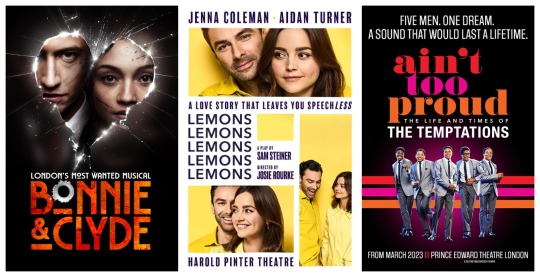
With the New Year fast approaching, it's coming to the time where we say goodbye to so many West End shows like Mary Poppins, Get Up! Stand Up! and Come From Away.
But equally, we're saying hello to a host of exciting new shows like The Great British Bake Off, Ain't Too Proud and The Unfriend. Plus, we're welcoming back lots of favourites like Dirty Dancing, Aspects of Love and Bonnie and Clyde.
Gosh, that's a lot to keep track of, right?
Well, luckily, I've popped together a handy spreadsheet for you to follow of all things in the West End in 2023! You can now stop struggling to remember which theatres are available next year, and start to keep track of everything there is to look forward to.
Let's take a closer look at what's new for 2023!
The Theatre Stats
With the new addition of @SohoPlace, there are 39 West End theatres in London. And despite 16 new productions coming to the West End in 2023, there are 13 theatres which still have space for programming throughout the year. There is just one theatre (Ambassadors) with nothing announced for it post-January.
One show is moving to its fourth venue (2:22 A Ghost Story) and just one show (Mrs Doubtfire) is due to be an open-ended run joining the 22 current long-runners - although Aspects of Love does not seem to have an 'end date' and is taking bookings until January 2024.
The Production Stats
Coming to the West End in 2023 are nine are musicals and seven are plays.
Of the nine musicals, three are American-produced transfers: Oklahoma!, Mrs Doubtfire, and Ain't Too Proud. The rest are either returns: Bonnie and Clyde, Dirty Dancing, Crazy For You and Aspects of Love, or new homegrown musicals making their West End debut: The Great British Bake Off Musical and Operation Mincemeat.
Of the plays, there are four that are brand new to the West End: The Unfriend, A Little Life and Lemons Lemons Lemons Lemons Lemons – all with star casts and the latter two at the Harold Pinter. The Lehman Trilogy is coming to the West End following its successful stint on Broadway and initial opening at the National Theatre.
The Pillowman, Noises Off and Medea are new revivals for 2023.
Thoughts?
Let me know what you think of the Ultimate Guide to West End Theatre in 2023 spreadsheet! Does it help you keep track? Will you be sharing it with your stagey friends?
The Guide will be updated as and when new shows are announced and others close - so make sure you have it to hand!
1 note
·
View note
Text
Why I’m not interested in the WhatsOnStage Awards
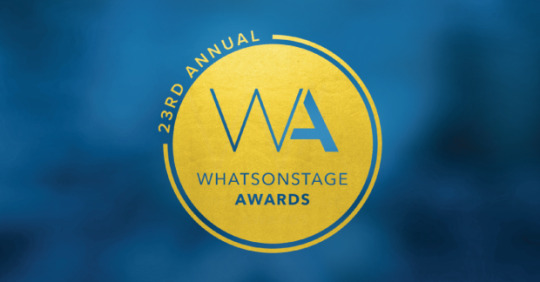
This year marks the 23rd annual WhatsOnStage Awards – the ceremony celebrating theatre up and down the country, as voted for and nominated by the public. I love a good reason to get together, dress up and have a laugh, but I won’t be taking part.
And this isn’t to take anything from the fantastic people and productions that are eligible or have won in the past. It’s simply my opinion as a fan of underrated shows and performers.
The awards cover a range of categories with production awards such as West End, Off-West End, Concerts but also performance awards for Best Takeover (i.e. new cast members in an already running show), and Professional Debut.
On the whole, the awards mean well and they include the all important fans where other awards are nominated and selected by an elite few. But there are just a few things that, for me, make me uninterested in the WhatsOnStage Awards.
The Eligibility Criteria
Generally, to be eligible for a nomination, the production, and therefore the performers, need to have begun between 26 November 2021 and 22 November 2022. But there are categories for long running shows such as Best West End Musical.
My first thought here regarding the dates is that the major history-making West End musical The Drifters Girl is not eligible this year, as it began previews in early November last year and shut in October this year. This meant it only a handful of weeks to get nominations in last year, vs shows that typically would’ve had nearly a year to garner a following. And since it closed last month, it isn’t eligible for Best West End Show either. And while all awarding bodies will have cut off dates, it seems unfair when it’s fans who have to nominate in.
One thing I do rate is that regional and touring productions are rightly squared up against each other as equals in most categories. With such high quality non-London productions, this seems fair and in my opinion, a more accurate reflection of the talent on display in this country. So this could range from the Great British Bake Off Musical in Cheltenham, to Bonnie and Clyde in the West End.
Even some performers themselves don't know if they're eligible, which seems to be an unfair skew towards people who do know.
And that’s what causes, in my opinion, the largest downfall of the awards.

The Nomination Process
Every year the WOS Awards occur, we get a flurry of performers and productions who rightly want to be nominated. And what an honour it must be to be nominated and even win an award where it’s come from the people. But these performers and productions shouldn’t have to ask to be nominated. Not least because some of the greatest performers don’t use social media which is WOS’ biggest communication channel, but the awards should naturally have a longlist of eligible performers and productions prepared, surely!
With regards to performer categories, some performers themselves seem unsure if they’re even eligible. And if they’re pushing for us to nominate them, and it turns out they’re not eligible, it seems deeply unfair on those who are eligible getting a reduced amount of nominations – particularly as you can only nominate one per category (more on that later…).
As it’s such muddied waters, in my opinion, the only way to clearly and fairly lay out the eligibility criteria is for WhatsOnStage to keep tabs on everything. Perhaps this is simply WOS having a database of everything that’s eligible each year as it opens, closes and performers change. Or maybe it’s WOS approaching the production companies to flag the parameters of eligibility if they would like to put forward their shows and performers. If the awards are something that productions should want to their name, this sounds like the fairest option. Especially as some brilliant shows only have a short run so their fanbase will only stretch so far, vs a long running show.
WOS’ news feed is particularly comprehensive so I’m sure it’s an easier task than retrospectively wading through the nominations to double check their eligibility.
But this is not the only reason I think it’s unfair to pin it on the consumer to nominate.
Fan-nominated and awarded accolades astronomically skew towards social media. It’s almost as if it’s a deep requirement to have a large online presence or celebrity status in order to be deemed a better, or award-worthy actor or creative.
And the nominators don’t even need to have seen the show to nominate – they could be a follower who just happens to like someone or, dare I say, be influenced by someone to nominate forward actors and productions that they haven’t any intention of seeing. And there’s no real way to stop it without WOS keeping a longlist of eligible creatives and productions.
This leaves an unfair shortlist of nominees… which is before we’ve even gotten to the actual award process.
Voting for the awards

Once the WOS Award shortlist is released, it is another round of asking for votes on social media, where again it feels like a popularity or ‘most followers’ contest. Or they can ask their followers to vote for their friends. While a follower may not actually go ahead and do this, the chances of them doing so are exponentially increased over someone who doesn’t ask.
And that also leaves what I’m coining ‘ghost votes’. I’m sure we’re all guilty of having voted in polls where we have no real association or care with what’s actually being asked, so we therefore vote for what has the most ‘recognisable’ quality.
The WOS Award voting process will always have people with good intentions voting for productions more than worthy of awards… but there will also be categories where you can vote for something you don’t care for. For example, I might want to vote for Bonnie & Clyde in all its categories should it be shortlisted for an award… and then I’ll come across Best New Play. I’ve not seen any new plays this year and yet I’m still able to vote in it, and it’s easy to just select something I’ve heard of rather than something I think is genuinely worthy of that award.
But that gets into weird voter ID territory. When Back to the Future was eligible for the awards earlier this year, they had QR codes projected onto the curtain - perhaps this is a fairer way of asking people to vote.
And while WOS say that they reserve “the right to cancel, terminate, modify or suspend nominations/voting should there be causes beyond its control corrupt or affect the fairness or proper conduct of the nomination/voting process”, it doesn’t take even a few minutes to see how easily fans like to exploit the awards process by voting more than once (with some even having dubious GDPR implications):

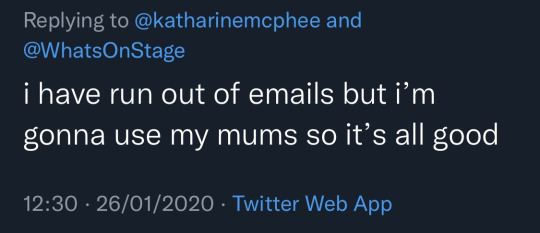
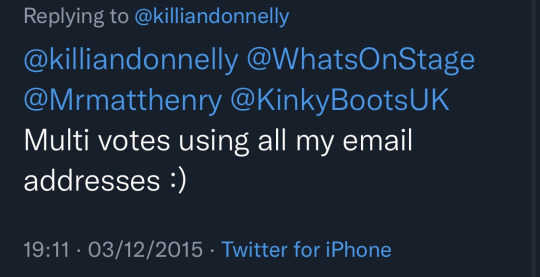
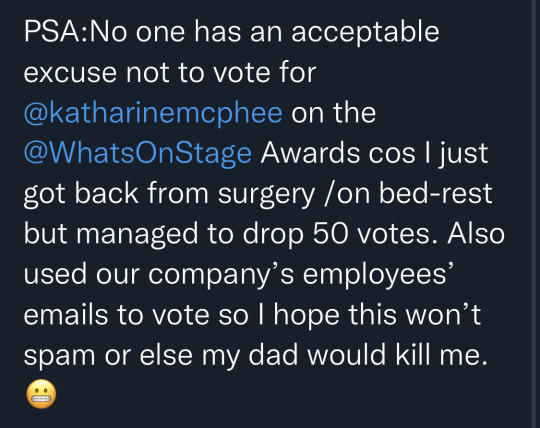
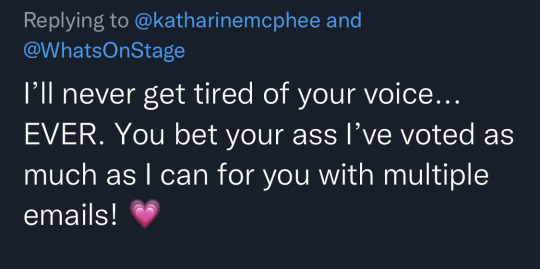
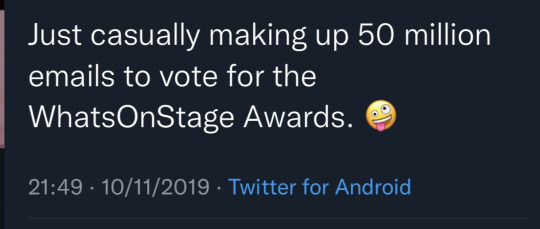

The Impact
This is pure speculation, but awards that are voted in this way, to me, don’t hold as much weight as other awards and therefore shouldn’t have industry impact.
It's clear to those who are fans of theatre on Twitter that these are solely fan nominated and fan voted, but I wonder if it's as clear to those who just pop to London and see posters covered in WOS Award accolades. Perhaps that's why WOS renamed the awards from the Theatregoers' Choice Awards.
Awards, on the whole, don't mean a great deal anyway; I'm at peace with the fact the majority of my favourite shows won't win awards for a variety of reasons, but they don't make or break shows like they're known to on Broadway.
I imagine when a fan favourite wins an award, the WOS social media interaction goes through the roof. Even by their own admission, WOS have shared that they operate as an advertiser, and perhaps an awards ceremony which feels like it includes the fans at the most foundation level is their greatest marketing tool. It makes the fans feel included and are able to dictate what is deemed award worthy - and in some way or another, fans will pretty much always dictate what shows stick and what don't.
But perhaps the WOS Awards are a marketing tool for producers. Similar to Musical Con, they prove who the most popular talent in the industry is, and who fans are willing to show up for and even pay money to see (the WOS Awards invite fans to purchase tickets to be in the audience). And you honestly can’t blame them, it’s practically free research that they’d otherwise have to pay thousands for. Producers could therefore angle particular actors to be in their own shows in future to increase ticket sales - it's already known that some casting directors consider who have a large social media following.
So in short, the awards don’t appeal to me because:
The nominations process is dubious as eligibility is vague, pinned on the consumer and the nominations should be held by the awarding body
Despite reflecting the entire UK’s talent-base vs other awards, the nomination and award process are predominantly reliant on asking for votes on social media
Having a dedicated social media shouldn’t be prerequisite for receiving awards
The inability to actually prove you've seen the material shortlisted inflates certain nominees coupled with ability to create multiple accounts to vote
All together, for me, these ruin the integrity of the awards
What do you think?
Have you nominated anyone for a WhatsOnStage Award this year? Will you be voting when the shortlist comes out?
*Images by Dan Wooller & WhatsOnStage
0 notes
Text
Why The Drifters Girl is so important.
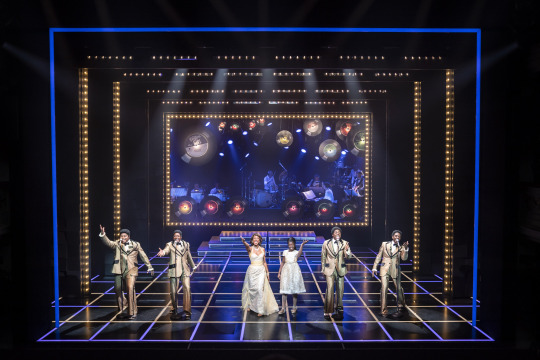
The Drifters Girl in the West End is closing its doors tomorrow. This show provides so much joy, story, class and emotion that Theatreland had been severely lacking post-pandemic. But sat in its humble 700-seater Garrick home, The Drifters Girl has been quietly revolutionary.
The Drifters Girl is the story of one of the first Black female music managers in the business, Faye Treadwell. With all the odds set against her, she fights a legal battle for use of the brand name "The Drifters". Treadwell's motif The Drifters are like the Yankees… The players may change but there’ll only ever be one New York Yankees is a line that is woven in the fabric of the group who still perform to this day. The show touches on topics of police brutality and the Vietnam draft unfairly enlisting Black men, but of course notes the success of The Drifters and the inner workings of the music industry.
As a lifelong fan of The Drifters, this show was an instant hit for me - my expectations were abnormally high, and were still astronomically exceeded. But its importance goes beyond five phenomenal vocalists tellings a story scored by a sensational back catalogue. And unfortunately those who haven't bagged a ticket before its closure are missing out on an important piece of musical theatre.
As far as I can tell, The Drifters Girl has been the only musical in the West End with an all Black cast in the 21st century. Sure, some have flirted with the West End - notably Porgy & Bess at Regent's Park Open Air Theatre - but The Drifters Girl is on one of the certified 39 West End stages.
I'm the last person to suggest that something needs to be on the West End to be considered good, but is this not a huge feat?
But what's even greater, and more historic, as confirmed by cast member Matt Henry, is that the original five principle actors on stage are all given credit for co-creating The Drifters Girl and are the first Black cast in West End history to earn royalties for doing so.
Something I can't confirm, although wouldn't be surprised if it were true, is that The Drifters Girl is possibly in the running for the most amount of characters played by the fewest amount of people on one West End stage. This small team of actors must play over 70 characters per performance - truly phenomenal stuff!
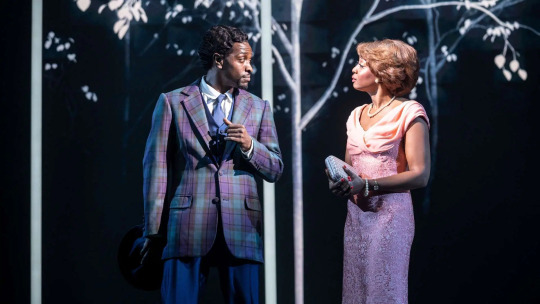
Something that stuck in my mind from the first time I saw The Drifters Girl in previews last year. It occurs was when Faye describes how she deals with twice the amount of discrimination as she's Black and a woman - her husband argues that they're on the same team. Faye responds "it ain't me who needs reminding, it ain't me who's forgotten". It made me think about social injustices we fight for today. Sometimes we spend so much time arguing about minor things on Twitter of what's right or wrong when we're on the same team; it scratches our credibility and stunts our growth in achieving a mutual goal.
The Drifters Girl is more than just another jukebox musical; it's a story that has more than earned its place in the West End. I've hardly even mentioned the music which is obviously the foundation for the show. But with a blog post this long, you're just going to have to trust me it's hit after hit after hit in this show.
Luckily though, I think this show will do well on tour. The Drifters themselves are still selling out local venues across the UK, as they have done for a number of years. Perhaps it was a mix of a post-Covid opening, the fact some people's unwillingness to open themselves up to new material, and the unfortunate stigma that jukebox musicals are tarnished with that left The Drifters Girl criminally slept on in its West End tenure.
But the magic created on that stage will certainly not be forgotten by me, or the thousands of others who went to the Garrick Theatre and experienced history in the making. Plus, I fully expect their cast album to be my most played on Spotify this year.
Congratulations to the cast and creatives of The Drifters Girl for a remarkable run in this beautiful show. I simply cannot wait to come over to your place on tour.
0 notes
Text
Why I'm not heading to MusicalCon

This year is seeing the launch of something theatre fans have been crying out for... MusicalCon. It promises a weekend-long celebration of all things musical where you can meet the stars, learn from the pros and celebrate the shows.
Sounds a stagey dream, right?
I personally decided to not go this year.
The current experiences that have been detailed, which require payment on top of the entrance fee, seem to include taking part in dance workshops. From what I've seen on socials, there seems to be a mixed bag of people who are going to better their dancing skills, and those who feel like they need to take part in *something* to justify the ticket.
As someone with limited dancing talent, I don't overly fancy paying to make a fool of myself in front of West End stars... but props to those who are keen! These days, I'm more of an appreciater than a do-er.
This is particularly exacerbated by the fact it seems super geared towards the under 20 musical fan market.
Don't get me wrong, I'd have bought the first tickets to a convention if there was a wider spread of talent like Aaron Tveit, Julie Andrews (imagine), Gary Wilmot, Scarlet Strallen, Joshua Henry and Ramin Karimloo would be there... or even modern composer legends like Alan Menken, Stiles & Drewe, and Jason Robert Brown. But I did have a feeling it'd be focused on the Heathers crowd - which is great news for them!
There's also been a bit of noise on socials about paying to meet the stars. This isn't unusual for fan conventions - Wales Comic Con boasted £80 on top of entry to meet and take a photo with David Tennant. But for musical theatre fans, meeting your idols is generally significantly 'easier' than film and tv; this is something I believe has caused a little friction between ticket holders and the organisers.
I personally wouldn't spend £30 on top of entry to meet someone who I could meet at stage door, or even bump into at a central London Tesco Express. I'd rather spend that £30 on a ticket to a show, and if I take a liking to one of the actors, I'd swing by stage door and snag an autograph if I'm lucky.
What particularly interests me about MusicalCon is the £195 Weekend VIP Pass. Some folks on Facebook have said they "naively assumed the VIP extra ticket price meant that stuff would be included" and I think that's completely fair.
Upon launch of these passes, they included: VIP main stage viewing area, VIP access to book autographs, photo opportunities and workshops, VIP lanyard & goody bag, and a (limited availability of) MusicalCon t shirt.
It's that 'VIP access to' that I think has slightly led some customers astray.
The price point below the £195 Weekend VIP Pass was the Weekend Priority Pass, costing £89. This simply included priority access to book autographs, photo opportunities and workshops. The £195 VIP Pass should be including one hell of a goody bag to justify the extra £100 between that and the Priority Pass!
Some folks are even passing up their opportunity to book workshops early due to the fact a limited amount of scheduling has been announced and they don't want to miss out on something better coming along. Perhaps something on the Main Stage, like the unannounced panels, Q&As and interviews - this is definitely something I'd be more likely to enjoy.
But for me, the biggest anti-selling point, was how this may go some way towards inadvertently increase theatre ticket prices.
If I were a big theatre producer, I'd be keeping tabs on which meet & greets sold out. Because if folks are willing to spend £30 on spending a few minutes with their favourite star, they'd probably be happy paying £5 more per ticket for two and a half hours' worth of time in the same room as them, right? It feels like it makes musicals even more commercialised than they currently are.
When it comes down to it, though, it'll be a great way to meet likeminded musicals fans in one room together. Our collective passion for the form is truly unmatched and will, I'm sure, be worth the entry fee.
One reason I wish I did have a ticket to MusicalCon for me is the marketplace exhibitors. It is SO rare to find decent musical theatre merch, particularly if your favourite shows aren't currently being staged.
It'll be featuring some excellent stagey small businesses including AmeliaStitches for all your embroidery needs, TheatreAndThreads to jazz up your jackets, LettersToJuly to decorate your scrapbooks, Scrunchies4Theatre to accessorise your hair, ThePlayhouseArthouse to swankify your walls and MusicalTheatrePins for your collector's items.
If you're a ticket holder, make sure you get yourself down to visit these stalls!
I hope everyone who bought a ticket to MusicalCon has the most divine time and gets exactly what they want from it. Curating a new event from scratch is a pretty impossible task, so to open to a sell out audience is phenomenal.
Let me know what you think - did you buy a ticket to MusicalCon? Do you wish you had?
1 note
·
View note
Text
Are concert revivals the answer to post-Covid theatre?
It's no surprise to anyone that theatres are struggling to get numbers in post-Covid; not least because there was an initial nervousness to head back into a room full of 1,000 others, but the cost of living is leaving many with less disposable cash.
And it seems theatre's answer to this is revive well-known modern shows... in a different format.
Beautiful: The Carole King Musical's 2020 tour was lost to Covid, but returned as an all-new actor-musician production in collaboration with three regional theatres, including Leicester Curve. This theatre has been on a roll as they also revived Billy Elliot and A Chorus Line. Kinky Boots' new production kicked off in Ipswich. We've had three revivals of Gypsy since Sondheim passed last year. And 42nd Street was announced to be returning to London under different creatives.
Over the summer, among others, we saw concert revivals of Chess and Kinky Boots, and as of today, Once the musical has been announced to be returning in concert form.
That's just to name a few off the top of my head!
Gypsy, Kinky Boots, 42nd Street and Billy Elliot revivals don't appear to be adding anything strikingly different to the material, unlike actor-muso Beautiful. We just (over the last 8 years) have had full-scale West End versions of all of these shows so they're firmly in the memory of a lot of theatre fans' memories. In fact, we've even got all except Beautiful professionally recorded.
However, if it's a chance for people to relive some incredible theatre from the last few years in some form or another because it gets them back into the theatres, it makes financial and artistic sense.
But there's the rub: I do not understand concert versions. I just don't.

For a start, they actively strip back what we love so much about so many of these shows such as choreography, huge sets and costume.
The concerts have consistently been in West End theatres in evenings, so chances are that folks outside of London will actively need to make arrangements to stay over. And I don't overly want to get home late when I've got to go to work the next morning in order to experience these 'one-off' events.
Chess already has a filmed concert version readily available, and the full-scale production was at the Coliseum only a handful of years ago.
And the price increase? Extortionate. I paid £15 to see Chess at the front of the Balcony at the Coliseum, but the equivalent seat for the half-staged concert version was £51.20!
I love Kinky Boots as a show, but it's the full-scale choreography, the costumes, the lighting, the characterisation that makes Kinky Boots what it is. The score just by itself is just alright pop songs.
I didn't attend the concert - not least because it cost £84.20 for the equivalent seats I previously sat in for a full-scale production of Kinky Boots (which totals more than the three tickets I paid for to see it before). But because the amateur licence has recently been released, I can see it in a number of venues across the country and support local theatre - which I already have.
And now we've had Once the musical in concert announced, it follows another production which fell to Covid. It's even more expensive than the previous two concerts, boasting £116 for front Stalls, and the cheapest Stalls seat being £74. Even the back of the Grand Circle is £39.

For what it's worth, I paid £27.75 for a ticket to the full-scale production of Once.
But what also gets me is that these productions manage to piggyback off the awards the originals won.
For example, Once the musical in concert has been advertising it as a 'Winner of 8 Tony Awards'. Well, that'd be true if it was the same leading man, director, orchestrator, scenic, sound and lighting designers - but we know that's not the case.
So the concert version just naturally won't have all the award-winning elements of the original production.

I understand that producers are under immense pressure to deliver as we approach a recession. But to me it looks like a lot of work goes into these concerts (some have had more advanced choreography and costumes) for just... a one-off.
Why is there only demand for one-off performances? Is it because they want more well-known names attached to the shows and they're already tied up in other longer running productions? Do these one-offs rake in a lot of money to give an initial boost?
So many questions!
To me, I'm not sure the material of each concert holds up on its own. And perhaps that's why they've nearly all had West End star casts to cover for the mildly lacklustre choices of show. And they must be giving the theatres, production companies and performers enough of a boost financially and professionally to make all the work that goes into these worth it.
But as an audience member, I just can't imagine wanting to see the majority of these concert productions, particularly at a cost which is higher than any full scale production I've been lucky enough to see before. I could just listen to the albums on Spotify, unless I'm particularly keen to see one of the billed performers.
I think that producers should consider audience members and their situations a little more. A big ask? Probably. But it makes me wonder who this is for, as this is pricing out under-30s, especially outside of London, who are the next generation of theatre-goers. And if they're not the target audience, then they should be. Producers should be concerned about the long-term effects of excluding this audience group.
There's now this tendency to get folks excited over a concert announcement on Twitter due to a build up, it then receiving lots of attention particularly from younger folks, then the price points are either driving them away, or make them feel like they need to be part of the exclusive one night only event because their fav is in it.
If you've made it this far, I'd love to know - what do you think? Are these concerts the answer to post-Covid financial recovery in the theatre world?
0 notes
Text
Review: Bugsy Malone at Theatre Royal, Bath ★★★★
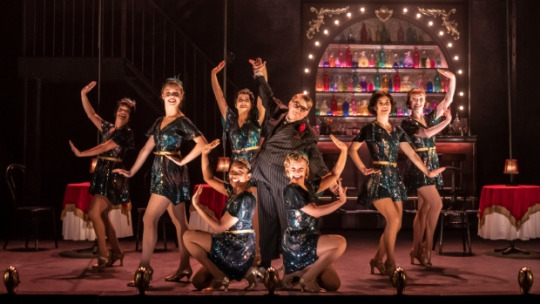
The 1970s classic returns to the stage and continues to showcase its loveable qualities. The glitz of Bugsy Malone makes it the perfect musical comedy tonic for today.
This prohibition era tale follows the tale of two gangsters, Fat Sam and Dandy Dan, fighting to death over splurge guns. This co-production of Bugsy Malone has kicked off its tour for three weeks at Theatre Royal, Bath.
The venue and stage are both compact, and make for a rather intimate setting, complementing Jon Bausor's backstreet New York scenic design.
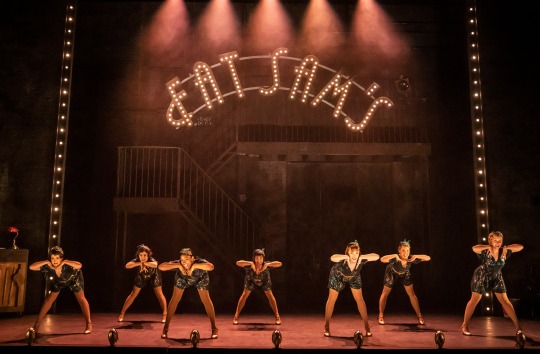
The future of musical theatre is in safe hands with Bugsy Malone's most unique feature - the children who take on the lead roles. Many of the cast are graduates of School of Rock, Les Miserables, and Mary Poppins — so the 9 to 15 year olds are practically seasoned actors. Playing the titular character this evening was Gabriel Payne, whose acting resumé is already set to impress at such a young age. His effortless commandment of the stage made this show such a joy to watch.
At this performance, Albie Snelson appeared as Fat Sam who drives the majority of the story forward, and exuded high energy and comic timing throughout. Desmond Cole's understated performance as Dandy Dan had the audience laughing before he'd even delivered his lines. Mia Lakha as Blousey provided a real sweetness to the show, whereas Jasmine Sakyiama was a fiery Tallulah — both glowing on stage with beautiful vocal performances. Aidan Oti's performance as Fizzy and tiny Cherry Mitra as Lena & Babyface both charmed the audience with their respective natural talent in the spotlight.
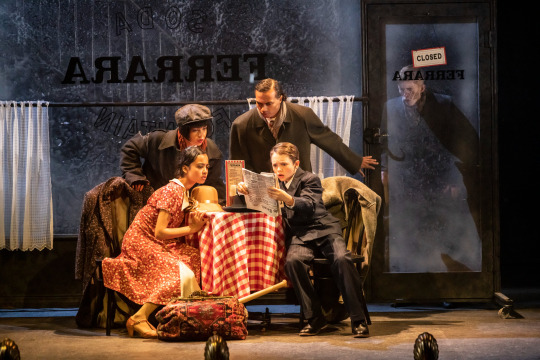
However, it's not just superstar children on stage at Bugsy Malone. They are backed by an ensemble of adult actors who also carry the show with endless charisma. They notably lead the two iconic numbers "Bad Guys" and "So You Wanna Be A Boxer?", where Drew McOnie's tight, synchronised choreography shone bright.
The stand out performance for me was in Act 2 with Mohamed Bangura as Leroy, whose physical and comic timing led the show to soar for the final twenty minutes.
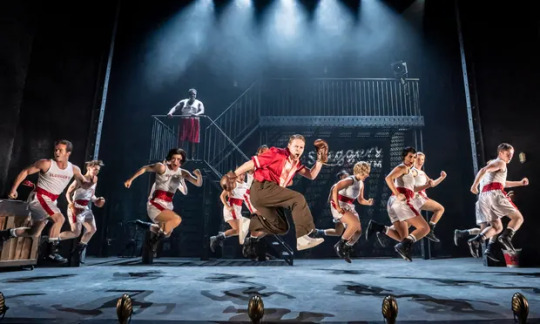
For me, this is a 5 star production wed to 3 star material. The glamorous high production value of Sean Holmes' Bugsy Malone covers greatly for a show with no real plot until Act 2. But sometimes escapism is the greatest drive for a show, and the razzle dazzle of the show certainly delivers!
Head on down to Fat Sam's Grand Slam Speakeasy until 23rd July at at Bath Theatre Royal, and then on tour across the country.
Photos by Johan Persson.
0 notes
Text
Why are there so many immersive musicals recently?
Last night saw the announcement of The Bridge Theatre's new production of Guys and Dolls, which used everyone's favourite buzz word - immersive. It promises that the small audience are part of the spectacle and able to party with the cast, whether they're standing or sitting.
The Bridge Theatre has a short history of immersive productions which included A Midsummer Night's Dream pictured below, which was described as a "delirious party", so with a showstopping number like Sit Down You're Rocking The Boat, I'm extremely excited to see what this production brings.
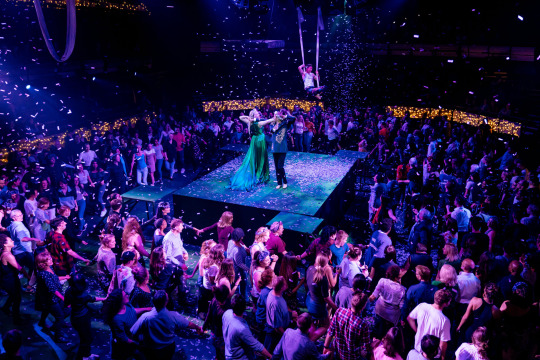
In the last couple of years, it seems "immersive" is the way forward. There's The Great Gatsby immersive experience, Doctor Who: Time Fracture, Monopoly Lifesized, the Peaky Blinders immersive dance show... they often seem to work with recognisable properties that have a concept rather than the material from scratch. And they're not in traditional theatres either.
However, it does make me wonder how truly "immersive" musicals can be.
The current London production of Cabaret flirts with the idea of immersive. It renamed its theatre, has its front of house staff act as if the venue is the 1940s Kit Kat Club itself and boasts premium table seats where patrons can enjoy a meal (is that really what happens in Berlin...?). But I'm unsure whether these are truly immersive, or if the audience just enjoys the unusual setting and extra detail. It seems to be working for the show though, bagging multiple Olivier Awards and being nearly consistently sold out.
Earlier in the week, the new production of Newsies headed for the Troubadour released its set, promising another all-immersive experience in the round (despite the thrust staging).
The seating arrangement feels far less "immersive" than than The Bridge had above. And that's not to say there's one strict way to do immersive, but it feels like it'd be far harder to be immersed with raked stalls. But there are some hints at what they're trying to achieve - the ladders are clearly signalling a level of audience participation or, at least, actors encroaching on your personal space.
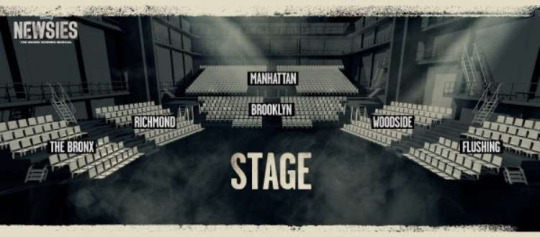
But is that immersive? Where can the line be drawn?
I've sat what was basically on the stage twice in a small, traverse theatre, where actors or set could be centimetres away from me.
I feel like there's a misconception between "immersive" and "site specific" - both related, but different concepts. And perhaps an audience member could be fooled into thinking it's an immersive piece based on an impressive, or expensive, set.
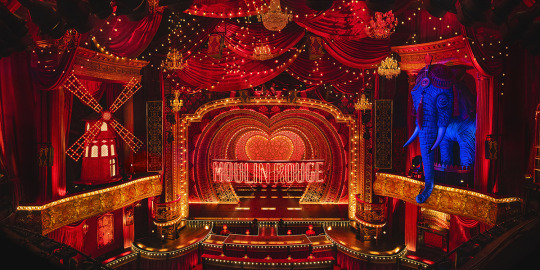
Similar to Cabaret, the Piccadilly Theatre has reinvented its interior for Moulin Rouge to reflect the real Parisian venue. But it firmly keeps itself to a standard proscenium arch with a small thrust stage. It has a beautiful protruding set, too.
But this, for me, is not what immersive theatre is, despite feeling more immersed than usual. Maybe it's the grandeur of a renovated proscenium arch subverting ideas of traditional theatre looks like that makes people feel immersed. And that could be worth the pricier than usual tickets.
The new site specific production of Witness For The Prosecution at County Hall teases an immersion by saying "you have been summoned for jury service" but as far as I can see doesn't label itself immersive. It uses language such as "step inside" to harness the experience, but without setting a precedent for audience participation.
Perhaps we should be using "atmospheric" in place of "immersive".
For me, "immersive theatre" is a production that simply cannot work without the audience. You could take Cabaret and put it on any stage and the material is fundamentally unchanged, but you couldn't produce a Punchdrunk show without the audience.
I can't comment on what Doctor Who: Time Fracture, for example, includes but it certainly helps to not have to be wed to specific material like a musical does.
I also think that there is no guessing as to why the "experience" shows are recognisable properties, or why more recently so many musicals want a piece of the "immersive" Cabaret cake.
Earlier this week, I wrote a piece about why Come From Away may be facing closure. And part of that is simply down to less disposable income, and a greater need to ensure the cash spent will be on something that guarantees a good night out.
The promise to "immerse" an audience member feels like it'll be more special; it sounds like it'll assure your experience is totally unique. Immersion relies on the audience, and your thoughts, feelings and actions could change the course of the show, but ultimately the show should affect how you feel leaving the theatre.
Theatre can transport you to another place, even when you're sat with a blank look on your face in a dark proscenium arch. But what if theatre could show, as well as tell, you that you're in another place. Perhaps it's worth that extra bit of money, or it's worth spending your spare cash on that to feel something more than you might at the London Palladium.
All this said, I'm looking forward to these future "immersive" productions. There's no hard and fast rule on what immersive entails, but the fact producers are trying new things in an unpredictable time is promising.
1 note
·
View note
Text
Why I worry for Come From Away
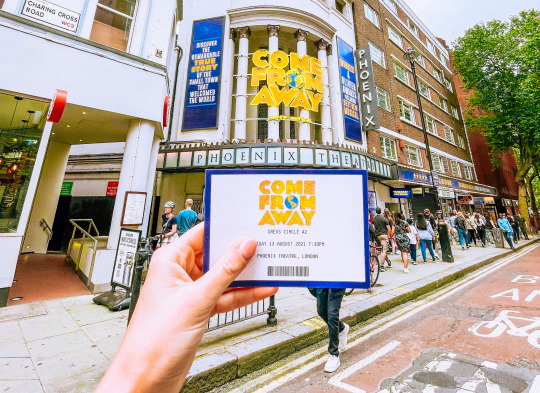
Most theatre fans know Come From Away is a gem of a show, telling the amazing story of the people in a small Canadian town called Gander in the days following 9/11. The music is beautiful, the real-life characters are inspiring and its one act has you laughing and crying, often at the same time.
But I just am concerned for the show's future. Essay incoming.
I've been wanting to write this piece for months, and have subjected multiple people around me to practically a live audiobook on why I think what I think regarding Come From Away. And I didn't want to write it in order to seem negative, because the show is brilliant.
However, since Broadway has now announced the show will be closing, I feel now is time to discuss why I've been mildly predicting the show will close in the West End, too.
Again, this is not to take away from the plethora of wonderful performers in the show or the brilliance of the production. I love Come From Away.
But I'd like to start with the unfortunate circumstance of the pandemic.
Following two years of instability with income, a cost of living crisis and constant doom and gloom, on the surface, Come From Away is a hard sell. Us theatre fans know it's an uplifting story on the whole, but do the general public?
If I hear Come From Away summed up, it's often 'that 9/11 musical'. Does this fly in a post-COVID state where we want to escape for a couple of hours and live in a bubble of joy?
Historically, musicals have been a source of distraction. There's a whole subsection of musicals that were specifically post-9/11 - think Hairspray, Billy Elliot, Wicked - all tackling topics that weren't covered in the advertising and branding.
Those in the know of Come From Away are aware the negative tagline that comes with the show doesn't particularly capture its content or message. But I do wonder how the ticket booths on Leicester Square manage to sell tickets to people who simply have never heard of it before.
For me, though, it starts with the title - 'Come From Away'. What does that mean? It doesn't tell me exactly what it is compared to something like 'Tina - The Tina Turner Musical', or 'Back to the Future: The Musical'. The show, unfortunately for a British audience, lacks the brand recognition that dominates the West End these days. Nearly everything is either a West End staple (Les Mis, Phantom), a high-profile Broadway transfer (Hamilton), a movie musical (Pretty Woman), or a jukebox musical (&Juliet). Come From Away just doesn't have that. There's a lack of interest in new musical theatre in the UK, but that's a whole other blog post.
With money being tighter these days, would the non-average theatre-goer want to spend their limited disposable income on something where they can't nearly guarantee to have a good night out? Brand recognition, in the UK theatre scene, counts for everything. And yes, it might 'kill off' original work, but if it gets people into a theatre, I would encourage it at this time. We're in a world where theatre is actively fighting TV: Netflix dominates our entertainment consumption, Saturday night telly is free, and we can find something we want to watch on demand at any time. I know if I'm spending upwards of £100 on an evening including tickets, travel, food and hotels, I'd want to make sure the reason I'm there will ensure I'm satisfied.
I'm trying to think in recent years what is Come From Away's biggest comparison. It's a very American show, not least in the material but the content obviously would resonate with an American audience more than a British one. And historically Brits don't always take to American material.
The biggest like-for-likes I can think of in recent years is Hamilton and The Book of Mormon. Hamilton had the hype bubbling for a long time, it felt inevitable it would transfer. And with the excitement of it turning period-drama casting on its head, fusing musical theatre with modern genres, and fans finally getting to see what it was all about, it was immediately a sure-fire hit.
The Book of Mormon, however. Another weird title, at least to most Brits where Mormonism isn't (or wasn't!) that widely known. Was it a show about Christianity?
Similar to Come From Away, they never performed on TV, unlike shows such as Six or Jersey Boys who make regular primetime appearances. But the posters were everywhere, on buses and tubes - the Mormons are coming - with still no real giveaway of the show's content. Hype was building across the West End. And those who knew it was from the creators of South Park, who probably don't mind me saying aren't the typical musical theatre fan, were most likely to be in attendance. This was coupled with huge theatre fans who were excited for it to land on British turf following a dominance at the Tony awards. Word of mouth soared.
Come From Away just didn't have any of this casual theatre-goer hype brewing, but mostly just the theatre fans who knew this show.
So, a musical faced with a lack of brand recognition, a slightly odd title, a very American-focused story, and a tagline immediately tarring the show with negativity is in a West End theatre during an economic crisis.
It's probably no wonder it's often discounted on apps like TodayTix (that's not to say others aren't as well). The marketing teams are working overtime trying to capture the true essence of this show, I'm sure.
But perhaps it was destined to be that way.
Come From Away plays at the Phoenix Theatre. Since Blood Brothers finished up its 21-year run there in 2012, the Phoenix has not seen a long standing show since. Nearly all the subsequent productions had roughly a two year stint; pandemic-exclusive, maybe it seems Come From Away is headed that way. Maybe the Phoenix is secretly a venue that likes to rotate shows? Or perhaps that's public knowledge.
Because even the shows that ran at the Phoenix prior to Come From Away all seemed to have a recipe for success with a British audience. Once the Musical - famous cast members; Bend it like Beckham the Musical - brand recognition; Calendar Girls the Musical - Gary Barlow's fanbase; Guys and Dolls & Chicago - Hollywood star casting.
In my opinion, we need more houses that are willing to take on short-term hits as we're almost over-loaded with long running productions. Which is great for breaking records, but not so great for new shows deserving of a large-scale home.
It would be a shame to lose a musical with genuine heart in favour of something more jazzy or with fame that pre-dates the show's existence. Particularly one as universally loved as Come From Away, whose heart is simply in the right place at a time where we could use a little more love.
0 notes
Text
Review: Anything Goes at Bristol Hippodrome ★★★★★
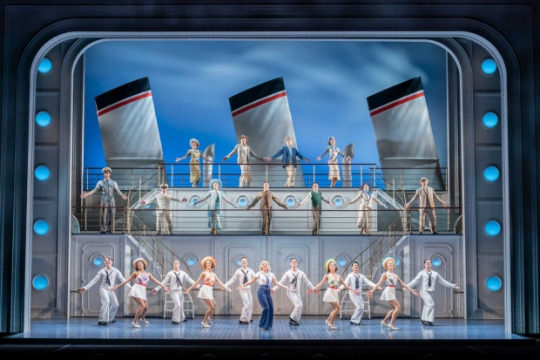
This farcical 1930s classic has set sail on tour! Hot off the heels of its London run last summer, and provides a wonderful night of musical escapism.
Featuring the newly Olivier award winning choreography by Kathleen Marshall, Anything Goes follows the SS American's voyage to England; on board are no celebrities, but public enemies, Lords, gamblers, aristocrats and stowaways.
Going in to this, I knew some were surprised that leading lady and West End royalty Kerry Ellis known for huge roles such as Elphaba in Wicked and Nancy in Oliver! was cast as the all tap-dancing Reno Sweeney. But Ellis seamlessly shows off her dance school graduate skills throughout, with of course particular highlights being the title number where I believe I broke a sweat more than she did! Kerry brings a real sweetness to the role that I hadn't seen explored before. Each subsequent number and scene she's in goes from strength to strength.
Bristol's audience was lapping up every perfectly timed punchline and showstopping numbers - one moment being the mind-blowing Blow, Gabriel, Blow where some audience members prematurely cheered not realising even more was to come (although, much of Anything Goes' score teases us into thinking it's the end!). This number practically stopped the show with the rupture of applause, to which Kerry, with impeccable delivery, says: Hallelujah, they've seen the light!
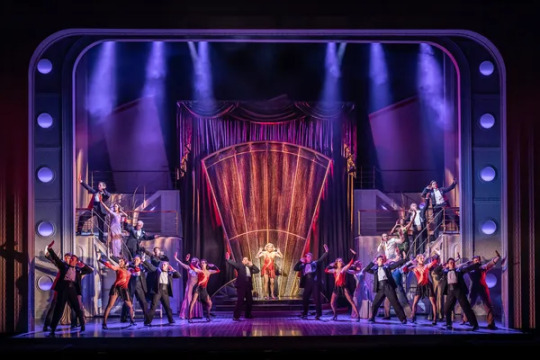
The SS American set is as gorgeous as ever in this harbourside city, and the audible gasp at its reveal after the first song was a lovely moment. The lighting felt even more vibrant in the Hippodrome compared to its previous London home.
It was wonderful to see the return of Samuel Edwards as Billy Crocker and Nicole-Lily Baisden as Hope Harcourt whose chemistry is still as water-tight as it was in London. Haydn Oakley continues to tickle audiences with his Englishman caricature Lord Evelyn Oakleigh, notably during Gypsy In Me.
The recently Olivier award nominated Carly Mercedes Dyer returns as Erma, and while she may not actually be on stage for long, Dyer ensures not a line, movement or moment is wasted in gaining the audience's love leading up to her stellar number where she owns the stage in Buddie Beware.
In addition to Kerry, new main cast members since its London run include Denis Lawson as Moonface Martin and Simon Callow as Eli Whitney, and provide lots of laughs and slick moments of slapstick comedy. Bonnie Langford as Evangeline Harcourt is a perfect casting; Langford's comic timing brings such a heart to the show. However, I can't help but feel she should be in the big dance numbers!
And the UK tour welcomes a host of new members of the ensemble, who without this show would not wow. The stamina and synchronicity of this ensemble cast is worth the ticket price alone.
Anything Goes is sailing across the UK before docking at the Barbican again this summer - tickets can be found here.
0 notes
Text
The Olivier Awards and its missing categories
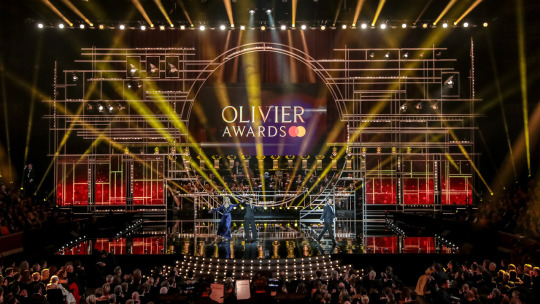
Tonight is the 46th annual Olivier Awards ceremony. Lots of excellent shows have been recognised, and I'm thrilled for them! I look forward to celebrating theatre in a time that has been so difficult for this industry.
Although, I can't help but wish there were more categories to recognise the breadth of talent that theatre showcases. So, I'm choosing to dream about the categories I'd love to see!
Best Understudy
After a chaotic festive period where West End, panto and regional theatre alike relied on the supreme talents of swings, alternates and understudies, it seemed apt to want to give them recognition. How they'd manage to judge this category, I don't know (that's for the big wigs to figure out) but if they're capable of judging shows that have closed, I'm sure understudies could get a look-in too!
Had this been a category, I'd have nominated Will Haswell for his performances as Marty McFly in Back to the Future.
Best Touring Production
As someone who isn't London-based, it frustrates me to no end that the only productions eligible are those that have been performed in a theatre paying membership to the Society of London Theatre; the awards were previously called "Society of West End Theatre Awards".
London shows aren't the only shows that contributes to the rich theatre scene our country boasts. In fact, I'd argue not enough theatre begins out of town - two Olivier nominated shows, The Drifters Girl and Back to the Future: The Musical, this year began their life in Newcastle and Manchester respectively. And shows shouldn't have to then rush to London in order to get recognition and awards; it feels like this is why Beauty and the Beast is returning to the Palladium this summer. I honestly believe people will travel to see the theatre they want to see.
Again, logistically, I don't know how this would work. Would we exclude shows that jump off the back of West End success, and is therefore reserved for new shows/exclusive revivals? Is it for just the performances and whole production?
Had this been a category, I'd have nominated The Osmonds: A New Musical UK tour and the Beauty and the Beast UK tour.
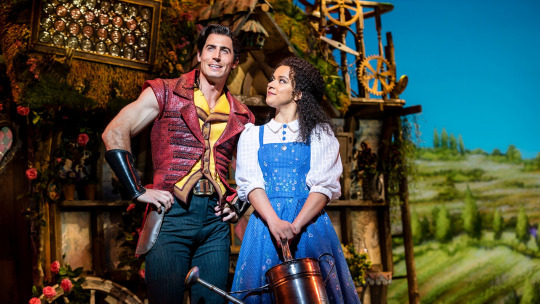
Best Ensemble
Some of the best shows don't have a lead, and some of the best shows rely on a quality ensemble. This is where I feel the nominations fell especially flat.
For me, The Drifters Girl especially relies on the chemistry, versatility and characterisation of the ensemble. The four men who play The Drifters need to be able to play countless characters all interconnected with each other. It's both theatrically clever and pure talent of the ensemble cast. And the fact that all four actors were missed out on the Olivier nominations this year seems borderline criminal. To me it feels they could only nominate all or none as the ensemble is integral to the piece, and the performance categories are often limited to four nominations.
In addition to The Drifters Girl, had this been a category, I'd also nominate Anything Goes as the precision, energy and talent of that many people on one stage was one of the biggest spectacles of last year for me.
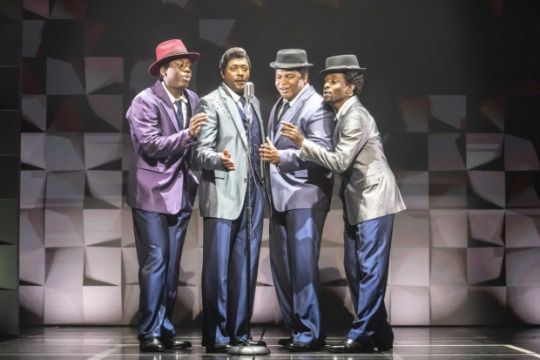
Best Digital Theatre
Much like the rest of the industry, the Oliviers needs to catch up with 2022. News, sports, entertainment and so on is digitised, and so is theatre, and it should be recognised as such. In light of the last two years, lots of creators continued to create and we need to work to facilitate this new approach - if we can even consider it new!
This allows for so many new roles and skills to be cultivated under the theatrical umbrella, and for existing skills to be developed in a new form. Particularly following The Unofficial Bridgerton Musical's Grammy win, we can't continue to ignore this platform. Once the Oliviers break free from its London shackles, perhaps British-born digital theatre can be recognised.
I have to be honest in that I haven't caught any recent digital theatre, but that doesn't mean it's not out there (obviously!). I know I'm going to be looking out for more, particularly as it becomes more prevalent and London theatre prices continue to rise.
Best New Score
Well, this kind of exists, right? But this year's nominations saw Anything Goes (a revival, but with new orchestrations), Back to the Future (a new musical but with three unoriginal songs), Get Up Stand Up (jukebox) and Life of Pi (a play) listed.
And I adoooore jukebox musicals, nearly all of my favourite shows are biopic jukebox musicals, but what motivation does a new composer have to create new musicals when a lack of new scores dominate the New Score/New Orchestrations category? Can we split out jukeboxes?
With foundations and charities in place to support new composers, such as the Stephen Sondheim Society, it seems only fair we reward those who shape their craft based upon a legacy of excellent musicianship.
And that's my round up of Olivier Award wishful thinking! I think it'll be some time before an institution breaks down barriers to entry, considering the industry itself is still grappling with recognising talent outside the M25. But rest assured the fans see the talent, and I look forward to the Olivier Awards this evening, supporting my favourite shows from the last year.
3 notes
·
View notes